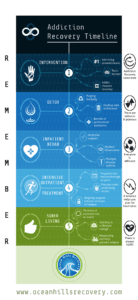Addiction is a disease that affects every part of a person’s life, and the grip of addiction can last for years. It’s only logical then that recovery should be a lengthy process. It may not always be obvious that progress is being made, and overcoming addiction can be a difficult struggle with many setbacks and plateaus.
Fortunately, by understanding the timeline of recovery and what to expect along the way, you can plan ahead and understand that the things you are going through are normal. This can help you through the hardest periods and remind you that there is always light and hope beyond these temporary struggles.
Below are the common stages of the recovery process. Bear in mind as you approach your journey that everyone’s situation is different. Some people may spend less time in some phases than others, and some may skip certain steps entirely. However, the addiction recovery timeline below is a common path toward sobriety and can help you to put your current struggles into context.
Intervention
The first step to recovery is admitting that you have a problem and choosing to take responsibility for that problem. In a 12-step program, this step is called “Admitting Powerlessness.” It means that you recognize that your drinking or drug usage is problematic and that you do not have control over your use of the substance.
Many people arrive at this stage after hitting a “rock bottom” moment or receiving a similarly dramatic wakeup call. Others may simply come to realize that substance use is causing harm. Your friends and family may help to guide you in this direction as well.
Whatever brings you to this moment, the intervention stage is a crucial one as no change can be made without it. An addict who is not motivated to change his or her behavior will not get far in the recovery process. Once you admit that there is a problem, you can begin seeking help.
Continued after image…

Detox
Detox is the period immediately after you stop an addictive substance and begin to undergo withdrawal symptoms. The physical withdrawal period depends on a variety of factors:
- The substance you’re addicted to.
- The length of time spent abusing the substance.
- Your overall health.
- Method of abuse.
When you develop a physical dependency on a substance, your body must undergo a physical process to purge itself of the substance and return itself to functioning normally. Withdrawal symptoms may peak within a day of the last dose and last for several days or weeks.
It’s often a good idea to have medical supervision during your detox period as drug and alcohol withdrawal can make you feel very sick and in some cases be medically dangerous. Having a professional available to help manage your symptoms can keep you safe and as comfortable as possible.
Inpatient Rehab
After the initial detoxification period, you may require intensive support to help keep you on track and prevent relapse. Inpatient drug rehab programs allow you to stay in a facility where all of your basic needs are kept so that you can focus on recovery without outside distractions or temptations.
A common inpatient addiction recovery timeline may be based around a 30-day, 60-day or 90-day inpatient period. This program period starts with the detoxification process and lasts through the challenging weeks after detox while setting you up for aftercare.
In addition to providing medical observation and eliminating opportunities for relapse in the weeks after detox, inpatient treatment centers may provide a variety of therapy options ranging from psychotherapy and cognitive behavioral therapy to alternative medicine and holistic treatments. The goal of these therapies is to provide the patient with healthy coping skills and begin treating the underlying issues responsible for substance abuse.
Intensive Outpatient Treatment
Intensive outpatient treatment describes the ongoing therapy provided on an outpatient basis. It often happens after inpatient treatment, but some people prefer to jump directly into outpatient treatment due to an inability or unwillingness to spend time in an inpatient facility.
Intensive outpatient therapy sessions may last for an hour or two at a time once or more per week and could also include homework assignments to work on between sessions. If you’re doing a group-based program, you may be involved in support group meetings during this time.
The purpose of this treatment is to provide ongoing support to help prevent relapse while tending to the underlying issues responsible for the addiction. Many people engage in substance abuse because of mental health issues or other problems that they are trying to self-medicate. Therapy can help to manage these issues and provide healthier alternatives. Depending on your needs and budget, this treatment can last for a few months or several years.
Sober Living
Recovery is not a single event. It is a process and lifestyle change. Many people find that ongoing social support from fellow recovering addicts helps to prevent relapse and provide a much-needed support network. Some people may also find tremendous benefit in providing support and mentorship to others who are just starting out in the recovery process.
Altogether, the addiction recovery timeline may last anywhere from a few months to a lifetime depending on your situation and goals. What’s important to realize is that it gets easier every step of the way as you get the help and support you need.













